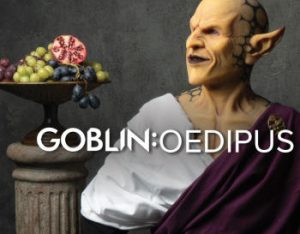
Goblin:Oedipus At The Stratford Festival
There once was a king named Oedipus Rex.
You may have heard about his odd complex.
His name appears in Freud’s index
’Cause he looooved his mother.
The late Tom Lehrer had some mild fun in song with the mythological tale told by Sophocles 2,500 years ago in his tragedy Oedipus Tyrannus (Οἰδίπους Τύραννος). Now Goblin:Oedipus, currently at the Stratford Festival’s Studio Theatre, takes the same source material and dials the comedy up to eleven.
Goblin:Oedipus is a production of A Spontaneous Theatre, the brainchild of master improvisers Rebecca Northan and Bruce Horak. It is a follow-up to their successful Goblin:Macbeth, which alas I missed.
How the hell Northan and Horak came up with the whackadoodle idea of goblins performing classical theatre is a mystery to me, but I bet the success of Goblin:Macbeth got other theatre creators thinking, “I’ll smoke what they’re smoking.”
The premise of their Macbeth outing was that three goblins came across the first folio of Shakespeare’s plays and decided to give this theatre thing a whack, choosing Macbeth because it’s the shortest of the Bard’s works. Now they’re hooked and Oedipus is their follow up.
Northan and Horak work with a third goblin played by Ellis Lalonde. The goblins are Wug, Kragva, and Moog. It’s impossible at first to figure out who’s who because the ingenious goblin masks created by Composite Effects look pretty much alike. I spent far too much time trying – and failing – to figure out how their masks, which cover their entire heads, allowed them move their lips. It’s a remarkable achievement.
Eventually I was able to figure out who was playing whom, but since the creators decline to identify performers with their roles I will maintain their discretion.
Goblin:Oedipus gets underway when the goblins enter the theatre from the street bearing an enormous phallus. They’ve clearly done their homework and know that the original play was presented as part of a religious festival in honour of the god Dionysius, a multi-tasking diety whose purview included wine, fertility, religious ecstasy, and – yes – theatre.
They waste little time explaining themselves, who they are, where they’re from, and why they’re here. Instead, they busily set the stage while playing audience participation games that are great fun. They do take the time to explain that any notions we might have picked up about goblins from “Lord of the Rings” are nonsense. (“Tolkein was an a**hole!”)
Scholars of Greek theatre that they are they take care to enlist twelve men from the incoming crowd to serve as chorus. They are issued masks and given a menu of vocal and physical reactions to use when they hear words like “suffering” and “blood.” The chorus is also called upon to recite – in unison – a few passages. They do a remarkably good job.
By the way, I am assuming that my readers, a remarkably sophisticated lot, are intimately familiar with the story of Oedipus, having enjoyed the fruits of a classical education.
The show gets off to a bit of a bumpy start when a stage manager (Meredith Johnson) informs the goblins that local laws prohibit opening the proceedings with a public orgy. But these goblins are troupers and, despite their dismay, they soldier on with their production of Oedipus.
They are using the translation by the late Canadian poet John Murrell. In an amusing but quite sincere bit they inform us that whenever a play by a dead author is presented the spirit of that author is in the room. And Murrell is wondering why he’s not on the Festival’s main stage!
Wug, a tall commanding figure, plays Oedipus, while Kragva plays all the other roles. Moog retires to one side of the stage to provide musical accompaniment. The music is a cleverly understated mix of old-fashioned radio-style sound effects and offbeat instruments that conjure long-vanished ancient Greek modalities.
Much of what follows is played for laughs. An episode in which half the chorus is enlisted to re-enact the murder of Laius, in a show-don’t-tell exception to Greek dramaturgy, is a highlight.
But much of Goblin:Oedipus is played straight, using Murrell’s sturdy poetry and it works surprisingly well. Wug proves to be a superb tragedian and Kragva excels in a variety of supporting roles. I found many moments to be truly moving.
In addition to providing loads of laughs, these goblins have some powerful lessons to teach us about the power of theatre to bring us together. Indeed at play’s end, as the blind and bloodied Oedipus makes his sightless way offstage, Kragva has the entire audience gleefully chanting a vile obscenity that perfectly encapsulates the king’s shame. Catharsis has seldom been this much fun.
The goblins may have been robbed of their public orgy, but they won’t be denied an ecstatic dance with the audience to end the show as that phallus gets passed around in joyous celebration of the life force that is theatre.
The fact that Goblin:Oedipus works as well as it does on several levels is a wonderment. Then again, who would have predicted that Northan’s idea for her cabaret turn, Blind Date (“A French clown on a blind date”) would turn into the comic juggernaut it became?
Goblin:Oedipus is being presented under the banner of the Stratford Festival’s Meighan Forum in a shamefully brief run. See it if you possibly can.
Goblin:Oedipus continues at the Studio Theatre through November 1, 2025. For more information and to purchase tickets, visit the Stratford Festival website.
Footnote: Northan and Horak were also responsible for the vastly entertaining improvised murder mystery, Murder on the Lake, at the Shaw Festival this season. It was pointed out to me that this is the first time a theatre company has appeared at both Shaw and Stratford in the same season.
[image: Stratford Festival]
For a complete index of reviews CLICK HERE.
Don’t miss another review or blog post! SUBSCRIBE HERE

